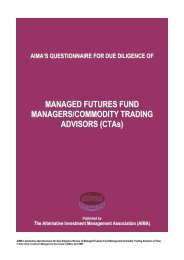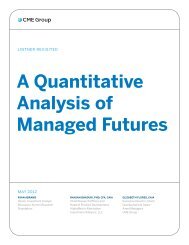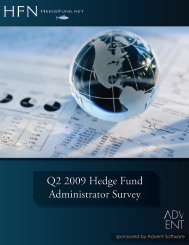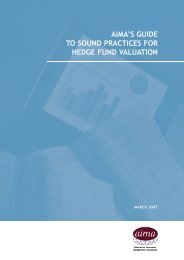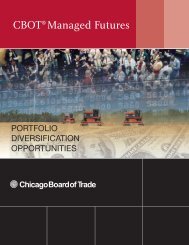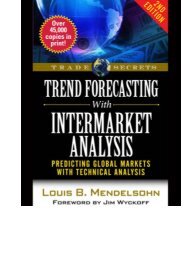Managed Futures - Schindler Trading
Managed Futures - Schindler Trading
Managed Futures - Schindler Trading
You also want an ePaper? Increase the reach of your titles
YUMPU automatically turns print PDFs into web optimized ePapers that Google loves.
Types of Investment<br />
Opportunities<br />
Participants in the<br />
<strong>Managed</strong> <strong>Futures</strong> Industry<br />
According to <strong>Managed</strong> Account Reports (MAR), in mid-<br />
2003, it was estimated that over $45 billion was under<br />
management by futures trading advisors worldwide.<br />
Currently, there are three primary categories of<br />
managed futures.<br />
Individual Accounts are usually opened by institutional<br />
investors or high net worth individuals. These funds usually<br />
require a substantial capital investment so that the advisor<br />
can diversify trading among a variety of market positions.<br />
An individual account enables institutional investors to<br />
customize accounts to their specifications. For example,<br />
certain markets may be emphasized or excluded. Contract<br />
terms may include specific termination language and<br />
financial management requirements.<br />
Private Pools commingle money from several investors,<br />
usually into a limited partnership. Most of these pools have<br />
minimum investments ranging from approximately $25,000<br />
to $250,000. These futures partnerships usually allow for<br />
admission-redemption on a monthly or quarterly basis. The<br />
main advantage of private pools is the economy of scale that<br />
can be achieved for middle-sized investors. A pool also may<br />
be structured with multiple trading advisors with different<br />
trading approaches, providing the investor with maximum<br />
diversification. Because of lower administrative and<br />
marketing costs, private pools have historically performed<br />
better than public funds.<br />
Public Funds or Pools provide a way for small investors<br />
to participate in an investment vehicle usually reserved<br />
for large investors.<br />
There are several types of industry participants qualified<br />
to assist interested investors. Keep in mind that any of these<br />
participants may, and often do, act in more than one capacity.<br />
Commodity <strong>Trading</strong> Advisors (CTAs) are responsible<br />
for the actual trading of managed accounts. There are over<br />
800 CTAs registered with the National <strong>Futures</strong> Association<br />
(NFA), which is the self-regulatory organization for futures<br />
and options markets. The two major types of advisors are<br />
technical traders and fundamental traders. Technical traders<br />
may use computer software programs to follow pricing<br />
trends and perform quantitative analysis. Fundamental<br />
traders forecast prices by analysis of supply and demand<br />
factors and other market information. Either trading style<br />
can be very successful, and many advisors incorporate<br />
elements of both approaches.<br />
<strong>Futures</strong> Commission Merchants (FCMs) are the<br />
brokerage firms that execute, clear, and carry CTA-directed<br />
trades on the various exchanges. Many of these firms also<br />
act as CPOs and trading managers, providing administrative<br />
reports on investment performance. Additionally, they may<br />
offer customers managed futures funds to help diversify<br />
their portfolios.<br />
Commodity Pool Operators (CPOs) assemble public<br />
funds or private pools. In the United States, these are<br />
usually in the form of limited partnerships. There are<br />
more than 1,500 CPOs registered with the NFA. Most<br />
commodity pool operators hire independent CTAs to<br />
make the daily trading decisions. The CPO may distribute<br />
the product directly or act as a wholesaler to the brokerdealer<br />
community.<br />
Investment Consultants can be a valuable institutional<br />
investor resource for learning about managed futures<br />
alternatives and in helping to implement the managed<br />
fund program. They can assist in selecting the type of<br />
fund program and management team that would be best<br />
6


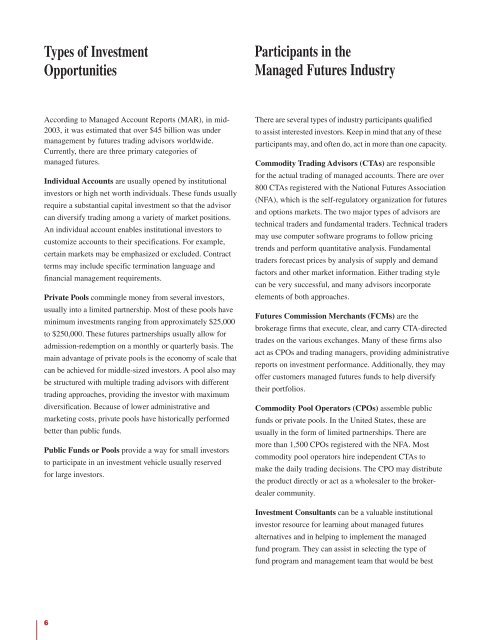

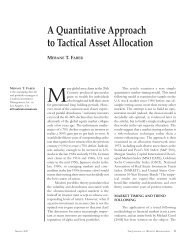
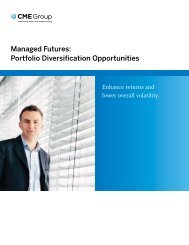
![Definitions & Concepts... [PDF] - Cycles Research Institute](https://img.yumpu.com/26387731/1/190x245/definitions-concepts-pdf-cycles-research-institute.jpg?quality=85)

